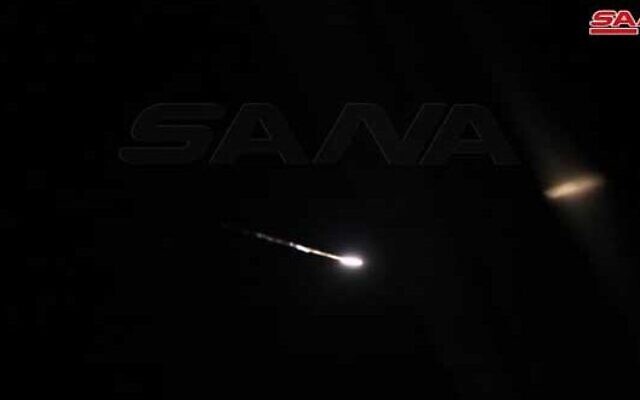Launch triggers sirens in Umm al-Fahm, West Bank; incident came after Syria said air defenses engaged ‘hostile targets;’ IDF hits Syrian anti-aircraft batteries in response

An anti-aircraft missile fired from Syria exploded in the air over northern Israel after midnight Tuesday, setting off warning sirens in the town of Umm al-Fahm and communities in the northern West Bank, the army said.
Residents reported hearing a loud explosion in the area. There were no immediate reports of casualties.
“A launch was identified from Syrian territory towards Israel. The missile exploded in the air and as such there was no need to carry out an interception,” the Israel Defense Forces said.
Shrapnel landed near the Homesh settlement outpost, causing a small fire, according to Rescuers Without Borders, a Jewish emergency service operating in the West Bank
The warning sirens came minutes after Syrian state media SANA said air defenses had engaged “hostile targets” near Damascus.
The IDF said that in response to the missile entering Israeli airspace, Israel had hit several Syrian anti-aircraft sites inside Syria, including “Syrian radar and anti-aircraft batteries that launched missiles at IAF aircraft.”
“The IDF will continue to protect Israel’s airspace and security,” the statement said.
A later SANA report, citing military sources, said that Israel had carried out two separate strikes, with jets firing missiles from southeast of Beirut in neighboring Lebanon. About 15 minutes later, a second barrage of surface-to-surface rockets was fired from the Golan Heights toward targets in the Damascus region.
Video purportedly showing Syrian anti-aircraft missiles launched during Israeli airstrikes in the Damascus area tonight. #Israel pic.twitter.com/gLF6iCR7YO
— Joe Truzman (@JoeTruzman) February 8, 2022
“Our air defenses have confronted the aggressor’s missiles and shot down some of them,” the report said, adding that officials were working to determine if the strikes had caused any damage.
Analysts generally dismiss such claims of shooting down Israeli missiles — heard after nearly every airstrike — as false, empty boasts.
Reports from Lebanon said that Israeli jets were seen in the skies at the time of the incident.
There was no comment from the IDF on the alleged innitial strikes, in line with its policy of ambiguity regarding its activities in Syria.
Errant Syrian anti-aircraft missiles have hit Israel before, with one even landing in nearby Cyprus.
The sirens in Umm Al Fahm #Israel #Lebanon #Syria pic.twitter.com/LUcg5JR9TI
— parallel_universe (@ignis_fatum) February 8, 2022
In April of last year, a Syrian missile also exploded in mid-air but only after crossing much of Israel’s airspace and eventually sent fragments crashing down, with pieces landing in the community of Ashalim, some 40 kilometers from the nuclear reactor in Dimona, without causing injuries or significant damage.
An IDF attempt to intercept that missile failed.
Israel’s alleged use of surface-to-surface missiles — in place of munitions fired from aircraft — has been linked to a recent meeting between Prime Minister Naftali Bennett and Russian President Vladimir Putin, one of Syrian dictator Bashar Assad’s main allies who has supplied much of Damascus’s air defense system. To avoid embarrassing Russia and its military technology, Israel reportedly agreed to rely less on airstrikes, which had repeatedly defeated the Russian batteries.
Israel has staged hundreds of strikes on targets inside government-controlled Syria over the years but rarely acknowledges or discusses such operations. Many of the strikes in the past had targeted the main airport in the capital Damascus, through which Iran is also believed to transfer advanced arms to its proxies.
Israel has acknowledged that it targets the bases of Iranian forces and Iran-allied terror groups, particularly along the Golan border, such as Lebanon’s Hezbollah, which has fighters deployed in southern Syria. It says it also attacks arms shipments believed to be bound for those groups.
Hezbollah is fighting on the side of Syrian President Bashar Assad’s forces in the decade-long civil war.
As reported by The Times of Israel
